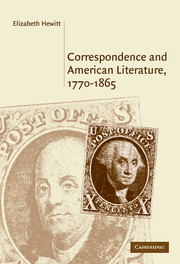4 - Jacobs's letters from nowhere
Published online by Cambridge University Press: 22 September 2009
Summary
Booker T. Washington's Up From Slavery begins by acknowledging the loss of origins that characterized the identity of African American slaves: he writes, “I am not quite sure of the exact place or exact date of my birth.” But he goes on to suggest that “As nearly as I have been able to learn, I was born near a cross-road post-office called Hale's Ford.” That his birthplace is referenced as proximate to a post office might not be especially significant, except that as his autobiography continues, he elaborates on the centrality of the post office to the dissemination of knowledge among plantation slaves. Striving to recall the first moment in which he was self-conscious of his status as chattel slave, Washington describes his mother waking him with prayers about “Lincoln and his armies.” This recollection induces him to wonder how it is that “slaves throughout the South, completely ignorant as were the masses so far as books or newspapers were concerned, were able to keep themselves so accurately and completely informed about the great National questions that were agitating the country.” Although Washington claims that he has “never been able to understand” how such knowledge was acquired, he almost immediately answers the question when he explains that slaves, even those located in the most remote locations, “kept themselves informed of events by what was termed the ‘grape-vine’ telegraph”:
[N]ews was usually gotten from the coloured man who was sent to the post-office for the mail. In our case the post-office […]
- Type
- Chapter
- Information
- Correspondence and American Literature, 1770–1865 , pp. 111 - 141Publisher: Cambridge University PressPrint publication year: 2004

